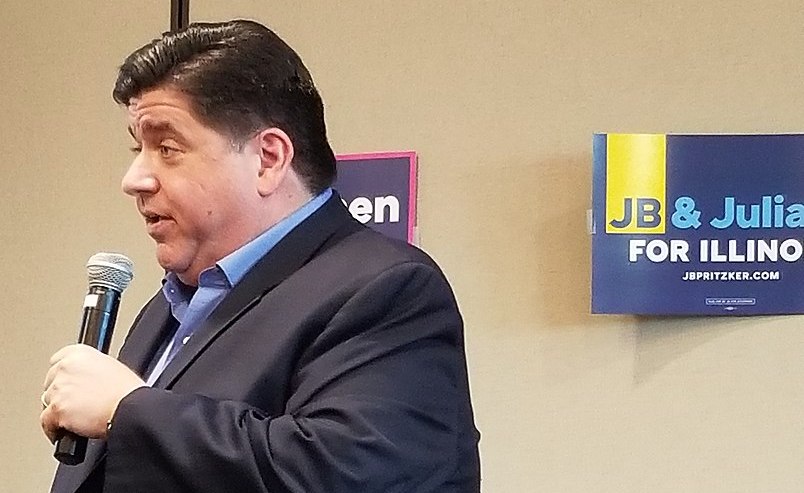Pritzker claims balanced budgets, but state reports show he’s wrong

Gov. J.B. Pritzker’s re-election announcement July 19 made it clear state finances would be central to his campaign, with boasts about balancing the state budget and making full pension payments for each year of his term.
The problem is, neither claim is true.
Illinois continues to grapple with large structural budget deficits and a growing pension crisis that is outpacing taxpayers’ ability to pay. If Pritzker really wants Illinoisans to grant him a second term, a good place to start would be telling them the truth about the state’s finances.
Pritzker claims his administration balanced the state budget. FALSE.
In an interview on July 20, Pritzker claimed his administration had balanced the budget for three years in a row. Unfortunately for Illinois taxpayers, as well as for the governor, this claim is false.
In each of the past three years, like every year since 2001, the state has ended the fiscal year with a general funds deficit.
- In Pritzker’s first year in office, the state comptroller reported the fiscal year 2020 budget ended $5.751 billion out of balance.
- In fiscal year 2021, Pritzker signed a budget that overspent its revenues by $5.95 billion on an annual basis. Federal borrowing proceeds helped close that gap in the short-term, but the budget is still projected to end the year $5.674 billion in the red.
- The most recent fiscal year 2022 budget signed into law by Pritzker is expected to result in an end-of-year deficit of at least $5.554 billion.
Deficits are nothing new to the Prairie State. In fact, Illinois has not had a balanced budget since fiscal year 2001.
Those deficits, reported annually by the state comptroller, represent the actual cash balance of the general funds at the end of each fiscal year. This is the proper way to define a balanced budget, because focusing on spending only within a single year can mislead about the overall picture. A family sitting down around the kitchen table would not claim to have a balanced budget for the year if their checking account was $20,000 overdrawn heading into the next year, for example.
Illinois is one of 15 states lacking a requirement to balance the budget at the end of the year and prohibiting deficits from being carried year to year. Its balanced budget requirement applies only to the planning stage and allows for significant gimmicks and accounting games to hide deficits.
State financial reporting acknowledges the reality of the budget deficit even when politicians fail to do so in their public statements. The fiscal year 2020 budget reportfrom the comptroller explains: “the $5.75 billion deficit that existed at the conclusion of fiscal year 2020 reduced subsequent year revenues available for operations and programs of the state and increased the amount of future revenue that must be utilized for debt repayment.”
Pritzker’s claim to have balanced the budget is far from the first time state politicians have misled taxpayers about state finances. In 2018, state lawmakers told the public that they balanced the budget. A few months later, official state reports to bond buyers admitted to overspending in excess of $1 billion.
The state still provides these disclosures to bond buyers, and, in the most recent disclosure, the state estimated that, at the end of fiscal year 2022 the budget basis fund deficit will be $5.554 billion. That figure rests on Pritzker’s claim of a $120 million surplus on an annual basis. However, the Illinois Policy Institute found the budget actually overspends by $482 million this year, meaning the end-of-year deficit could be higher than projected.
It is important to note that in these bond offerings, the state is legally required to share accurate information. When talking with taxpayers, the governor is under no such obligation to tell the truth.
Unfortunately, as long as some state politicians refuse to publicly acknowledge the state is running a deficit, the issue will be very difficult to resolve.
Pritzker claims the state paid its ‘full’ pension payments. FALSE.
Pritzker also claimed his administration paid its “full pension payment” three years in a row. This claim is false. The state has not made a full pension payment in the past decade.
In fiscal year 2020, the state of Illinois paid over $9.2 billion in direct pension contributions and $10.2 billion in total pension costs, including related spending such as debt service on pension bonds. This was the minimum contribution set by state law but was still not enough to prevent the state’s pension liability from growing.
This is because, when determining the state’s statutorily required pension payments, state estimates use much more optimistic, and less realistic, assumptions about investment returns. This leads the state to underestimate its debt. In fact, a comparison between state estimates, and those conducted by Moody’s Investors Service reveals the state underestimates its pension debt by $173 billion.
In addition to underestimating the debt, the state’s current funding policy violates best practices for public pension plans by targeting 90% funding rather than 100%.
This reliance upon faulty predictions ensures the state does not meet its full contribution.
According to the 2020 actuarial report from the Teachers’ Retirement System, the largest of the state’s five pension systems, the actuarially determined contribution – the amount needed to prevent pension debt from growing – was $8.9 billion. Under Pritzker, the state only contributed $5.7 billion to the teachers’ fund. Thus, Pritzker was $3.2 billion short of making a full payment for even one of the funds.
A similar situation played out in each of the state’s other pension systems, and, as a result, pension debt has increased dramatically under Pritzker.
A few months after Pritzker took office, at the end of fiscal year 2019, Moody’s estimated the state’s unfunded pension liability was $261 billion. After just one year under Pritzker, the state’s pension debt had ballooned to $317 billion.
Put another way, this new growth in pension debt means every Illinois family of four is now responsible for $65,413 of pension debt by Moody’s accounting, nearly equal to one year of each Illinois household’s median income of $65,886.
The lesson here is not that the state needs to contribute more to the pension system. Illinois already spends a larger share of its tax revenue on pensions than any other state.
The lesson is that state lawmakers need to be honest with taxpayers about the extent of the state’s pension crisis. They must adopt common-sense pension reform – the only viable solution to Illinois’ worst in the nation pension crisis.
That starts with a constitutional amendment to allow for reductions in future benefit growth for current workers and retirees. A constitutional amendment filed in the General Assembly in 2020 – House Joint Resolution Constitutional Amendment 38 – would have done just that.
If passed, an amendment mirroring the expired HJRCA 38 would open the door for reforms such as the Illinois Policy Institute’s “hold harmless” pension reform plan, which would save the state roughly $2.4 billion the first year and more than $50 billion through 2045. The plan would also fully eliminate the state’s pension debt during that time. It accomplishes all of that while preserving every dollar of pension benefits promised to public workers for work already performed.
Pritzker has failed to push for the significant financial reforms necessary to balance the budget and stabilize the pension system for taxpayers and public retirees. Rather than take credit for a job he didn’t really do, the governor should get serious about tackling the root causes of Illinois’ poor performance.
That starts with being honest about the state’s problems and what has – or hasn’t – been done to fix them.
Miss Clipping Out Stories to Save for Later?
Click the Purchase Story button below to order a print of this story. We will print it for you on matte photo paper to keep forever.

